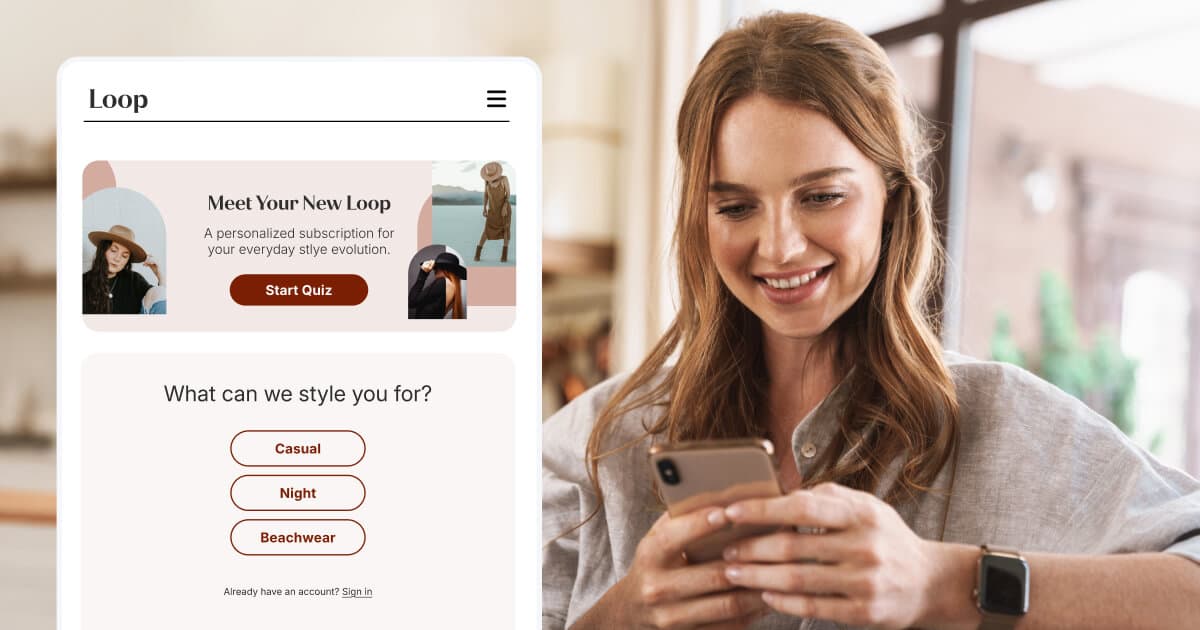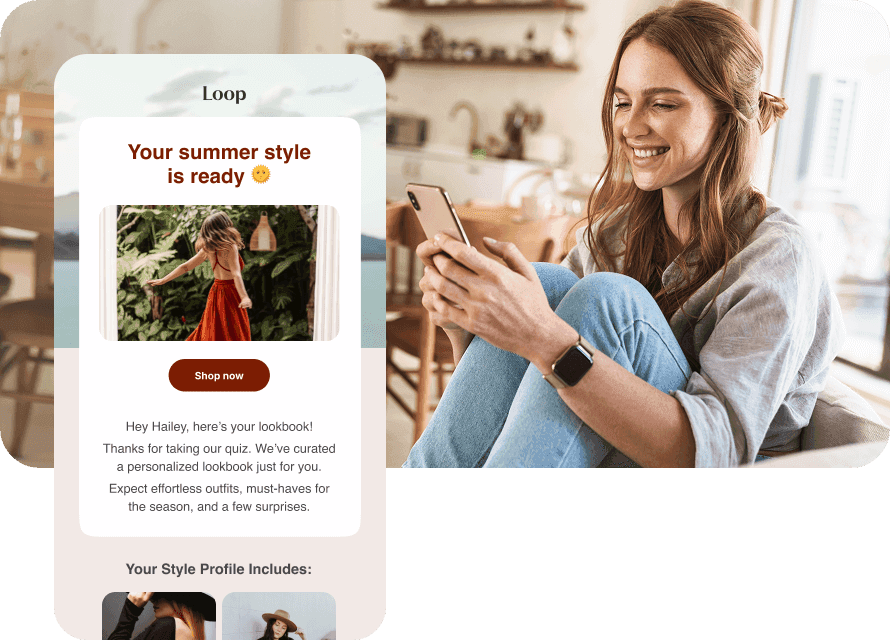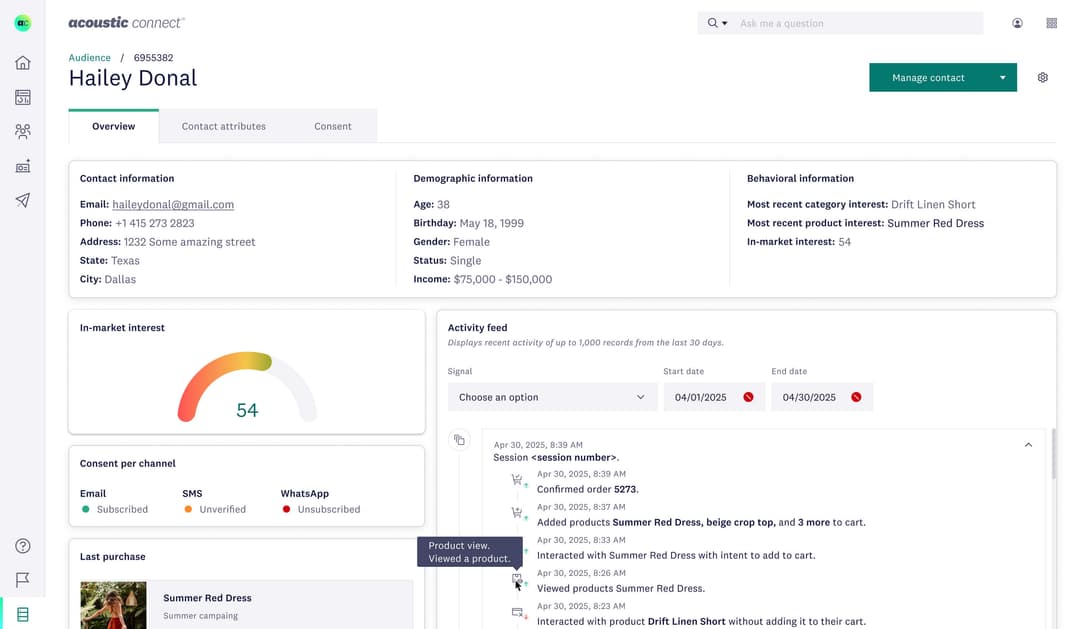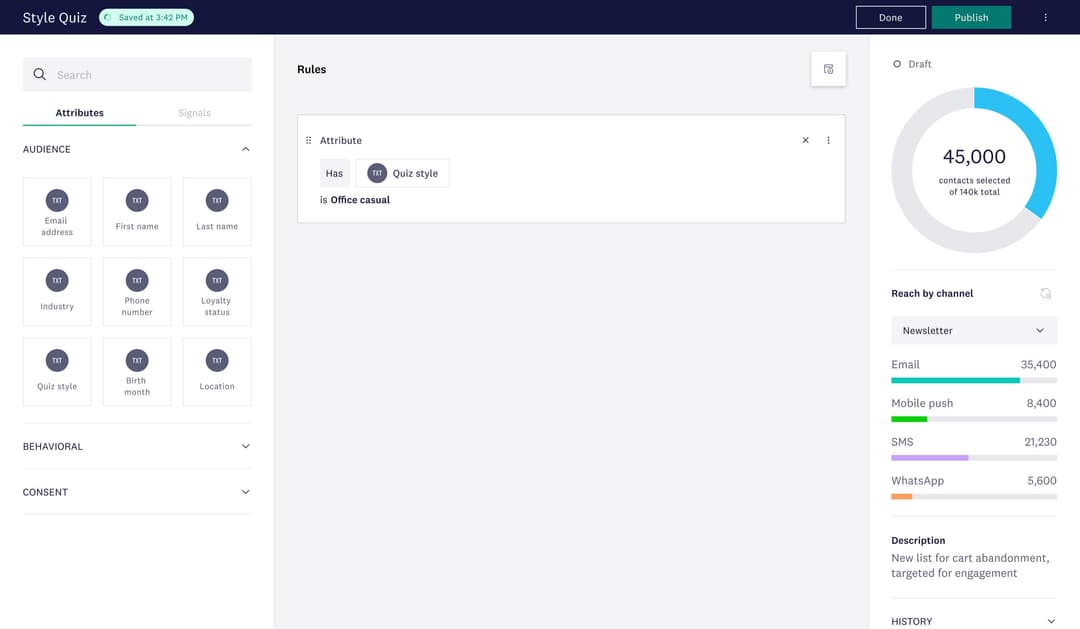Engage anonymous visitors with lead generation forms
Forms do more than collect emails or phone numbers — they’re your first opportunity to start a meaningful customer relationship. When used strategically, forms help you build richer contact profiles, capture intent, and turn casual browsers into known leads.

Challenge
Capturing leads through forms is more nuanced than it seems, especially when you're trying to engage first-time visitors who haven’t signed in, subscribed to emails, or identified themselves in any way. That’s why forms need to capture just enough information, at just the right moment, to identify anonymous visitors without driving them away. But even well-designed forms fall short if you can’t connect the submission to behavioral signals like repeated visits to a product category or specific on-site searches. Without that added context, it’s harder to improve audience segmentation, personalize follow-ups, or move high-intent visitors further down the funnel.
Goal
Use forms as a strategic entry point to convert anonymous visitors into qualified leads, enrich contact profiles with behavior data, and personalize experiences based on pre- and post-form behavior.
- Form completion/conversion rate
- Bounce rate on form web pages
- Traffic by source
- Cost per lead (CPL)
- Marketing qualified leads (MQLs)
- Email, SMS, and WhatsApp opt-in rate
- Post-form engagement rate
Best practices for lead generation forms
When you're trying to engage new visitors who don’t know your brand yet, your form is often their first real interaction with you. From design and placement to consent language and follow-up strategy, every detail plays a role in whether someone fills it out or bounces. These best practices will help you remove friction, build trust, and turn more anonymous browsers into leads:
Make it worth their while
Offer meaningful content and offers in exchange for form fills like early access to tickets or new products, tailored recommendations, or a first-time discount. When the value is clear, visitors are more likely to engage and share their information.
Keep forms short but smart
Don’t ask for more than you need. Start with the essentials (email or phone) and expand data collection with progressive profiling over time. Ask the right questions at the right moment to build a deeper understanding of your website visitor without overwhelming them.
Embed forms where intent is high
Place forms on product pages or within content experiences where engagement is already strong. Look for natural moments when a visitor might be ready to raise their hand on top of adding a form to your homepage, contact page, and demo page.
Refine audience segmentation from day one
Use form fields to capture key details, like skin type, preferred travel destination, or dietary preference, that help you segment new leads right away. Even one dropdown or multiple-choice question can give you enough context to send more targeted follow-ups.
Consider context alongside identifiers
Don’t wait for a form fill to start learning about your visitors. Capturing behavioral data like product views, searches, and interests helps you build a richer contact profile from the start. That way, once someone identifies themselves, you’re ready to deliver a more relevant, personalized experience and not just a generic follow-up message.
Put it into practice

An unknown visitor clicks through your summer lookbook ad, browses a few categories, and takes a “Find your summer style” quiz that ends with a form to see their results.
The form captures their email and style preferences, while also tying in their browsing behavior. This creates a rich contact profile you can use to trigger a personalized results email with curated outfit suggestions and a first-time offer.
Build lead generation forms with Acoustic Connect
Design engaging, responsive forms without code
Use a drag-and-drop editor to quickly design forms that fit your brand and embed them across your website. Capture emails or phone numbers with simple, mobile-optimized forms, and use fields like checkboxes, dropdowns, or toggles to gather valuable context without adding friction. Each form connects directly to your database and includes built-in validation and reCAPTCHA, so your lead data stays accurate and secure.
Make data compliance part of the experience
Be transparent about how you collect and use data by adding clear language and an opt-in checkbox to your forms. Ensure compliance with regulations like GDPR and CCPA by capturing consent directly through the form experience.
Automatically build contact profiles behind the scenes
From the moment someone visits your site, Acoustic Connect begins creating a behavioral profile, even if you don’t know who they are yet. Their activity is tied to that profile, so you can track what pages they browse, what products they view, and how often they return. As soon as they submit a form where they share their email or phone number, all that history gets pulled into a complete contact profile, giving you a fuller picture from the very first customer interaction.

Create personalized marketing campaigns with form and behavior insights
Segment contacts based on what they share in your forms — whether it's interests, preferences, or pain points — and combine that with their past behavior to deliver more relevant, timely messages. From welcome emails to lead nurturing campaigns and product recommendations, you can trigger automated customer journeys that speak directly to who they are and what they're interested in.

Re-engage visitors who didn’t convert
Not everyone takes the next step right away. If a website visitor submits a form but leaves before engaging further, you can follow up through email, SMS, or even retarget them with ads — all informed by a contact profile that captures their activity and preferences in one place. It’s a simple way to re-engage with context and keep your brand top of mind.
See what’s working and optimize what’s not
Track how your forms are performing and which messages drive action, all from dashboards built for marketers. You’ll see which forms convert best, how your lead capture is growing, and how your personalized marketing campaigns are performing across channels. With session replay and heatmap analysis, you can also see how website visitors interact with your form in real time, revealing friction points and opportunities to optimize the experience and boost conversions.
Smarter engagement at every step
Stay relevant throughout the customer lifecycle with personalized, always-on journeys.